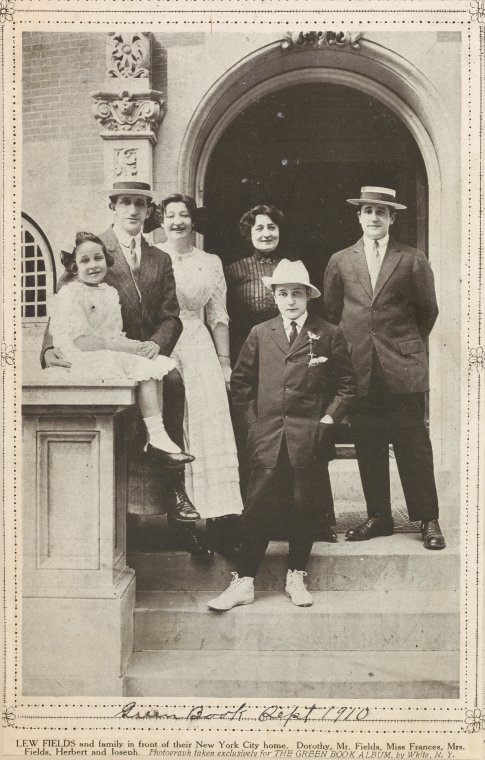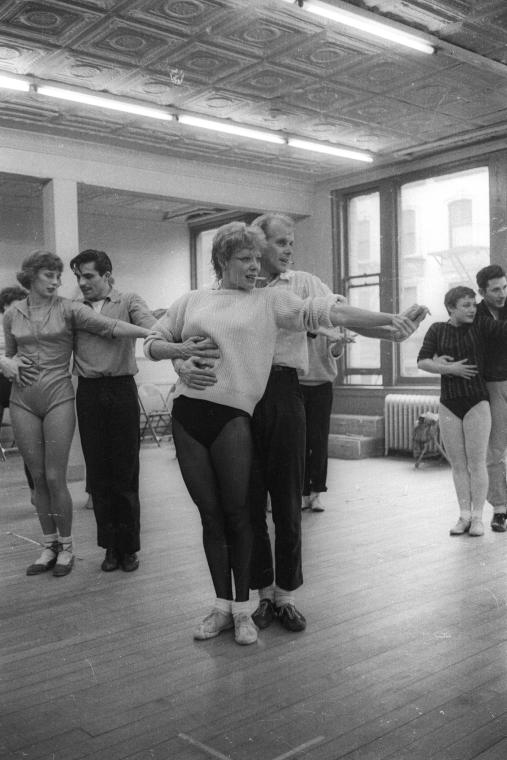Archives
The Lost Musicals: Redhead
 Musicals are often most associated with women, or at least with divas: the larger than life stars that musicals are built around. To get a show produced you want to have a decent score and story, but another thing that sells the backers — and the audience — is having a name attached. You need Ethel Merman, Gertrude Lawrence, Mary Martin, Julie Andrews, Chita Rivera, Angela Lansbury, Carol Channing, Bernadette Peters, Patti LuPone, or last but not least, the star of our show, that improbably sexy, brittle but strong, mercurial, redheaded dancer, Gwen Verdon.
Musicals are often most associated with women, or at least with divas: the larger than life stars that musicals are built around. To get a show produced you want to have a decent score and story, but another thing that sells the backers — and the audience — is having a name attached. You need Ethel Merman, Gertrude Lawrence, Mary Martin, Julie Andrews, Chita Rivera, Angela Lansbury, Carol Channing, Bernadette Peters, Patti LuPone, or last but not least, the star of our show, that improbably sexy, brittle but strong, mercurial, redheaded dancer, Gwen Verdon.
Verdon started her Broadway career as assistant choreographer to Jack Cole and danced in the revue Alive and Kicking (1950). Her next show, Cole Porter's Can-Can (1953) was her breakout role. Cast as the second female lead, Verdon had a couple of big dance numbers and her personality shone in the scenes. Verdon walked away with the show and the Best Featured Actress Tony Award.

Their next project, New Girl in Town (1957), was a Bob Merrill musical based on Eugene O'Neill's Anna Christie. It wasn't as big a hit as Damn Yankees, but largely thanks to Verdon's popularity and Fosse's inspired showcasing of her, it had a healthy run, and she won another Tony.
The next Verdon vehicle was Redhead (1959), but this time she wasn't the only woman behind the show. Female stars are usually on top in the musical theatre, but as far as writing is concerned, Broadway has always been a bit of a boys' club.
In recent years, a few women have written Broadway scores — usually only lyrics, but sometimes music as well. The pioneer female songwriter, the one woman in the first golden age of Broadway songwriters, a contemporary of Gershwin, Berlin, Kern, Porter and Rodgers & Hart, was Dorothy Fields.

Redhead, which had a book by Dorothy Fields, Herbert Fields, Sidney Sheldon and David Shaw, was murder mystery set in Victorian London. Dorothy and Herbert Fields had been ruminating on a mystery musical set in a wax museum since visiting Madame Tussaud's in the 1940s. In the interim, Herbert Fields died and Sheldon and Shaw took over the book. The project was shopped around to stars like Ethel Merman and Bea Lillie, but sat on the shelf until it caught the interest of Verdon and Fosse.
As successful as the mystery genre has been in novels, films and straight plays, most attempts to musicalize mysteries haven't worked. Maybe characterizing a musical that ran 452 performances and won 6 Tonys including Best Musical as a failure isn't fair, but I think we have to classify Redhead as a failure anyway. It's never revived, none of the songs became hits, and there wasn't a film adaptation.

Conventional wisdom says that it only ran that long because of Verdon, and it only swept the Tonys because it was a weak season. While the shows in the competition pool were generally undistinguished (apologies to fans of La Plume de Ma Tante, Whoop-Up and Goldilocks), but there was one great show to beat, (Rodgers and Hammerstein's Flower Drum Song) and Redhead beat it.
Redhead, set in a deliciously ghoulish Jack the Ripper atmosphere, focuses on a sheltered young woman (Verdon) who runs a wax museum with her two maiden aunts. When they depict the recent murder of an American chorus girl at the museum they are visited by the victim's former colleagues and friends, most notably the "Strong Man" from her show (Richard Kiley). Verdon's instantly and strongly attracted to Kiley and pretends to have had a vision of the killer to pique his interest. This silliness escalates into Verdon pretending the killer's attacked her so she has to hide in Kiley's show. Somewhere along the line Verdon gets a makeover (which turns her from a mousy brunette into — what else? — a redhead!) and they fall in love.
 The inevitable complications ensue when he finds out she's been faking, but all ends happily after Verdon throws herself in harm's way to catch the killer. If that sounds convoluted and confusing...it is. I have to admit, though, that I thought the red herring was the killer right until the dénouement.
The inevitable complications ensue when he finds out she's been faking, but all ends happily after Verdon throws herself in harm's way to catch the killer. If that sounds convoluted and confusing...it is. I have to admit, though, that I thought the red herring was the killer right until the dénouement.
In addition to the powerful ladies behind (and in front of) Redhead, some talented men were instrumental to its (relative) success. Bob Fosse's direction and choreography clearly made this show work. It was a total triumph of style over substance Fosse actually wanted to appear in the show himself, as the real killer, but thought it would be too taxing along with his other duties. (Leonard Stone, who did play that part, was nominated for the Best Featured Actor in a Musical Tony Award.)
Verdon's leading man (who took home the Best Actor in a Musical Tony) was a huge asset as well. Richard Kiley would become one of the all-time greats with his acclaimed starring role in Man of La Mancha (1966). And before you accuse me of bias, I'll forestall you by admitting that he's my personal favorite Broadway leading man. When cast in Redhead, Kiley was known for his performance as the Caliph inKismet, in which he introduced the hit song "Stranger in Paradise." He'd done a bit of film and television work, too and he had a few good films to his credit. The most notable film he'd been in was Blackboard Jungle, (1955) playing Glen Ford's naïve, sensitive fellow teacher, whose victimization in a destructive crime provides one of the film's most powerful sequences. Obviously, Redhead is Verdon's show, but casting her opposite a talent like Kiley — handsome, a great actor and one of the most gorgeous voices in Broadway history — didn't hurt.
![[Diahann Carroll (Barbara Woodruff) and Richard Kiley (David Jordan) in No Strings], Digital ID 1813966, New York Public Library [Diahann Carroll (Barbara Woodruff) and Richard Kiley (David Jordan) in No Strings], Digital ID 1813966, New York Public Library](https://images.nypl.org/?id=1813966&t=w)
The score is a mixed bag. Albert Hague turned out some catchy music and Fields' character writing is witty and specific as always. Because Verdon was on stage so much and had to dance so much, the score was tailored to allow her plenty of vocal downtime, especially in Act Two when she needed her energy for her show-stopping dance, "The Pick-Pocket Tango."
Verdon has a lovely, if unmemorable "I Want" song in the first act, "The Right Finger of My Left Hand," and "Merely Marvelous" is winning--and was probably even more so with the dance she did after it. Though Fields did manage some clever tongue twisters for the lyric of her comedy number, "Erbie Fitch's Twitch," it's one of those songs that'd supposed to be "bad" (in the contect of the plot) but still charming in the show, but it's actually bad and Verdon's phony British accent is more grating in this song than the others.
Musically speaking, the strongest songs are all Kiley's. He has a great duet with his sidekick (Leonard Stone) "She's Not Enough Woman for Me" ("Knows her trade enough/Not paid enough/She seems like a girl who hasn't played enough.") It's reprised later (after Verdon's makeover!) for Kiley as "My Girl is Just Enough Woman for Me."
Kiley also has a terrific second act angry song for the misunderstanding, "I'm Back in Circulation." ("I'm gonna book my nights/I'm gonna pick my spots/I'm gonna hang two dolls on my arm/I'm back in circulation/And I'm absolutely soaked in charm.") Both songs are steeped in appropriate masculine bravado and Fields is very witty with the lyrics. Kiley's duets with Verdon, "Look Who's In Love" (charming despite being too cutesy) and especially "I'll Try," are highlights of the cast album.

The choral numbers, "Uncle Sam Rag" and "We Loves Ya, Jimey" are generic and feel like filler. The opening, "The Simpson Sisters" is fun. There are two situation songs that highlight Fields' strength as a lyricist. Kiley and his sidekick (Leonard Stone) convince Verdon to come out of her shell, romantically, and do something foolish "Just for Once." ("if you're tempted to kiss a man then kiss him/And feel reckless and giddy with delight/If you don't want to kiss him then dismiss him/What can you lose?/You'll experience an interesting night!") In "Behave Yourself" Verdon's aunts give her simultaneous and conflicting advice on her first date with Kiley. ("You lower your lids/You look straight in his eye/Your dress is cut low/No, your dress is cut high!")
After Redhead, Fields and Verdon (and Fosse) teamed up again in 1966 for Sweet Charity, a complete triumph for everyone involved. Is Redhead a masterpiece? No, but there's plenty to enjoy from listening to the cast album and it must have been a fun show in the theatre. By all accounts, Fosse's staging elevated the mediocre material into an exhilarating evening. It truly is a lost musical, because it cannot and should not ever be revived, unless another Gwen Verdon comes along and Fosse's production can be recreated.
Those interested in the script can find it in the Dorothy Fields Scripts in the Billy Rose Theatre Division at the New York Public Library for the Performing Arts.
Read E-Books with SimplyE
 With your library card, it's easier than ever to choose from more than 300,000 e-books on SimplyE, The New York Public Library's free e-reader app. Gain access to digital resources for all ages, including e-books, audiobooks, databases, and more.
With your library card, it's easier than ever to choose from more than 300,000 e-books on SimplyE, The New York Public Library's free e-reader app. Gain access to digital resources for all ages, including e-books, audiobooks, databases, and more.
If you don’t have an NYPL library card, New York State residents can apply for a digital card online or through SimplyE (available on the App Store or Google Play).
Need more help? Read our guide to using SimplyE.
Comments
As seen by Hirschfeld
Submitted by David Leopold (not verified) on November 13, 2012 - 3:56pm
REDHEAD: LOST MUSICALS
Submitted by Lewis Martin (not verified) on February 5, 2019 - 11:05am